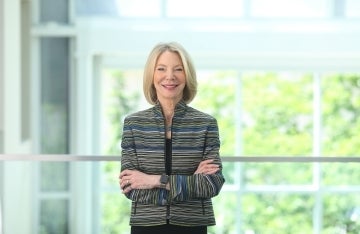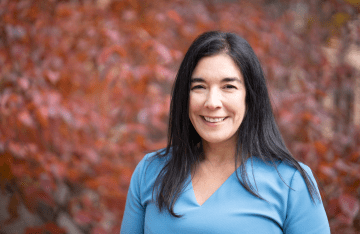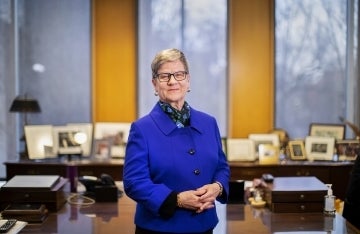As She Departs Penn, Amy Jordan’s Last Lecture Shares Life Wisdom
She shared advice with undergraduates that she wish she knew when she was 19.
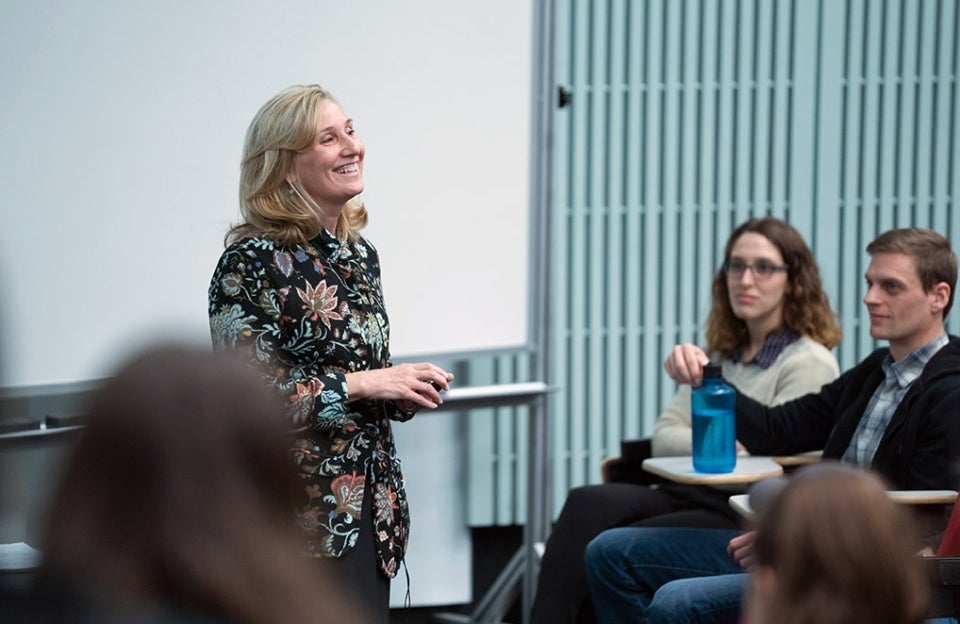
Over the course of 21 years, Professor Amy Jordan has taught more than 3,000 students and become a well-respected and beloved faculty member to countless students, faculty, and staff members.
It was an emotional occasion on Friday as Jordan, Associate Dean for Undergraduate Studies and Adjunct Full Professor at the Annenberg School for Communication, delivered her last-ever class lecture at Penn. Starting in January, she will be a professor at Rutgers University.
Instead of lecturing on the course material, Jordan, who is also a 1990 graduate of Annenberg’s Ph.D. program, instead shared with her “Introduction to Communication Behavior” students the kind of life wisdom that she wishes she could have given to her 19-year-old self.
Jordan received a standing ovation at the end of the lecture, with dozens of Annenberg faculty, students, staff, and alumni streaming in as a surprise. Doctoral Student Donna Lee, who was both Jordan's teaching assistant and a former undergraduate Comm major, made and showed a video tribute to Jordan, and her TAs organized a flower delivery.
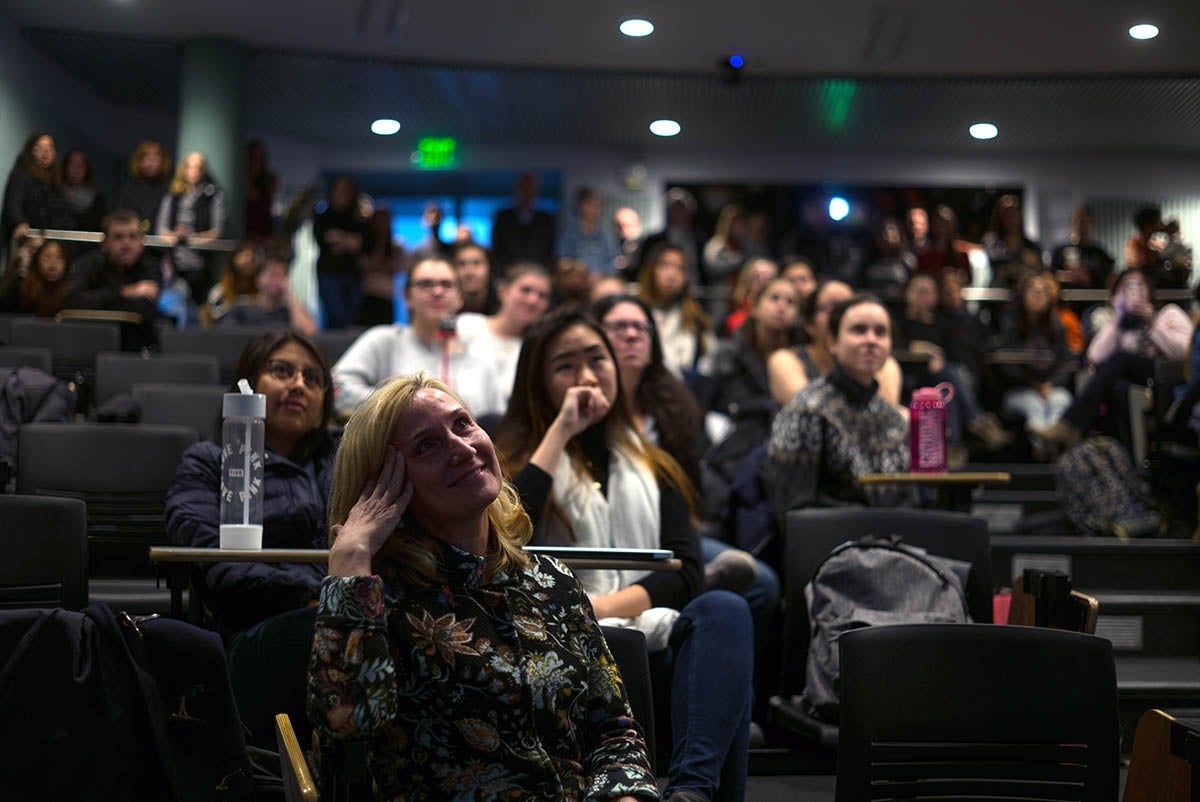
What follows is Jordan’s lecture in her own words, lightly edited for length. In it, she shares eight things she wish she knew at 19, two things she wishes she knew not to do, and three things she believes are worth remembering:
Do’s
1. Sit up front
“Sit up front” is my version of Sheryl Sandberg’s “Lean in.” But it’s more. Leaning in has come to take on the meaning, particularly for a woman, of asserting oneself, but sitting up front suggests something bigger than assertion. It suggests engagement. It suggests wanting to cut out distractions. It opens up opportunity to chat with your instructor as he or she is setting up or breaking down a lecture. It’s more than leaning in. It’s “all in.” When I was 19, I was in the back. I was passing notes as much as I was taking notes, and I think I passed up a lot of opportunity.
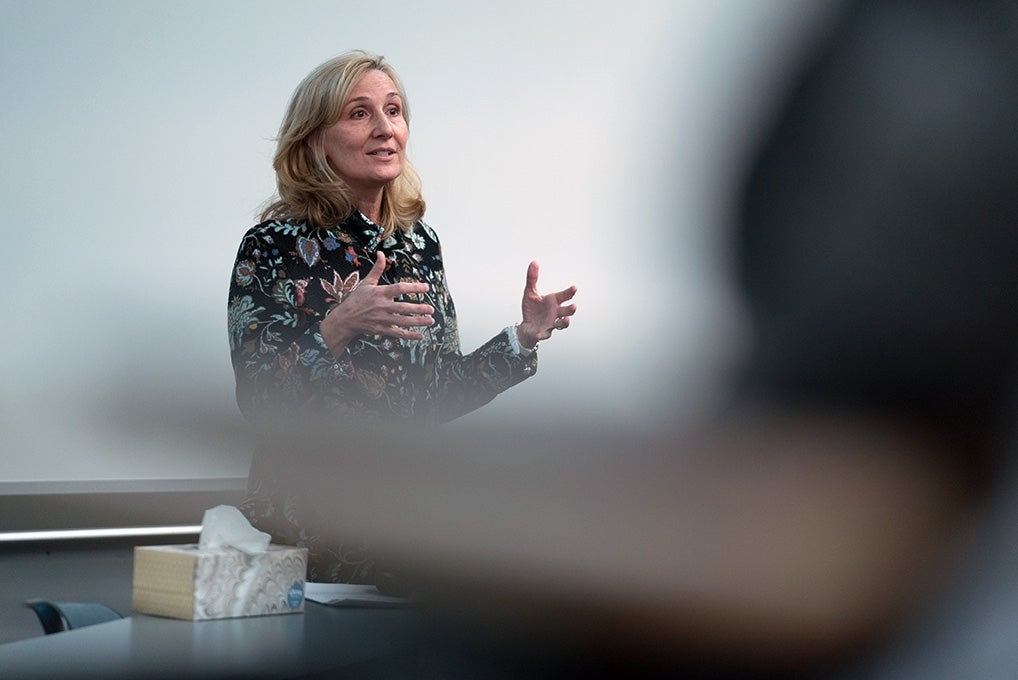
2. Take notes
We can debate until the cows come home whether it’s better to take notes on a laptop or to hand write them in a notebook. Most of you get the idea that if a professor is saying something important in class, you should write it down.
I’m not talking about those kinds of notes. Rather, if you visit a professor during office hours, or if you meet with a Penn alum for an informational interview, or if you talk with career services about internship opportunities — write it down. This matters on two levels: First, because the person has taken time out of their day to impart their wisdom, and they want to know that you are listening carefully. And second, because you might really want to remember what they said, so that you can follow up or adjust your paper or make new plans.
3. If someone offers to help, let them.
One of the scariest things I’ve had to do in my professional career is give a presidential address at the annual meeting of the International Communication Association. I started working on it in January, even though I wasn’t due to give it until June. And beginning in January, I started telling people how frightened I was by the prospect. So you know how they responded? With offers of help. Certainly only I could write my address, but they offered to listen. Sixteen different people listened to my address in its various iterations, and they suggested to me that maybe my PowerPoint wasn’t too great. That’s when a colleague offered to help, and for a solid week we went back and forth until he made my presentation beautiful.
4. If no one offers to help, ask them.
I know that I’ve had a privileged life here at Penn. One of the privileges has been getting to travel around the world to give academic seminars and workshops and talks. On my first trip to China, I traveled with a colleague named Libby and I brought my son David along. When the workshops were over, we decided we wanted to climb the Great Wall of China. Hours and hours after leaving Beijing, we arrived at a Great Wall gate. There was almost no one there, but someone pointed to the path and said it’s “up there.” It was WAY up there, and it was narrow and high and in some parts crumbling. I had 25 years on Libby and David, but I wasn’t ready to admit that I was out of my league. Libby and David were both distance runners, but I wasn’t ready to ask them to slow down. Libby and David were fearless, and I was nearly paralyzed by my fear of heights. They were plowing ahead. I had to ask them for help. I asked Libby to walk in front of me, and David to walk behind me, and then, only after I asked for help, did I feel secure that I would be able to make it.
5. Write thank you notes.
When I told my daughter that I was going to write to my 19-year-old self, I asked her whether there was anything I had told her 19-year-old self that she found particularly useful. She said it was the thank you note. Penn students are really good about writing thank you notes. And over the years I’ve received and saved hundreds of thank you notes. But even more important, she said, are the thank you notes that you write outside of the ones you send to your professors. Write a personalized note to every person that has taken the time to meet with you, share their time and wisdom. Tell them just how they helped you get an internship, see life a little differently, or feel more confident.
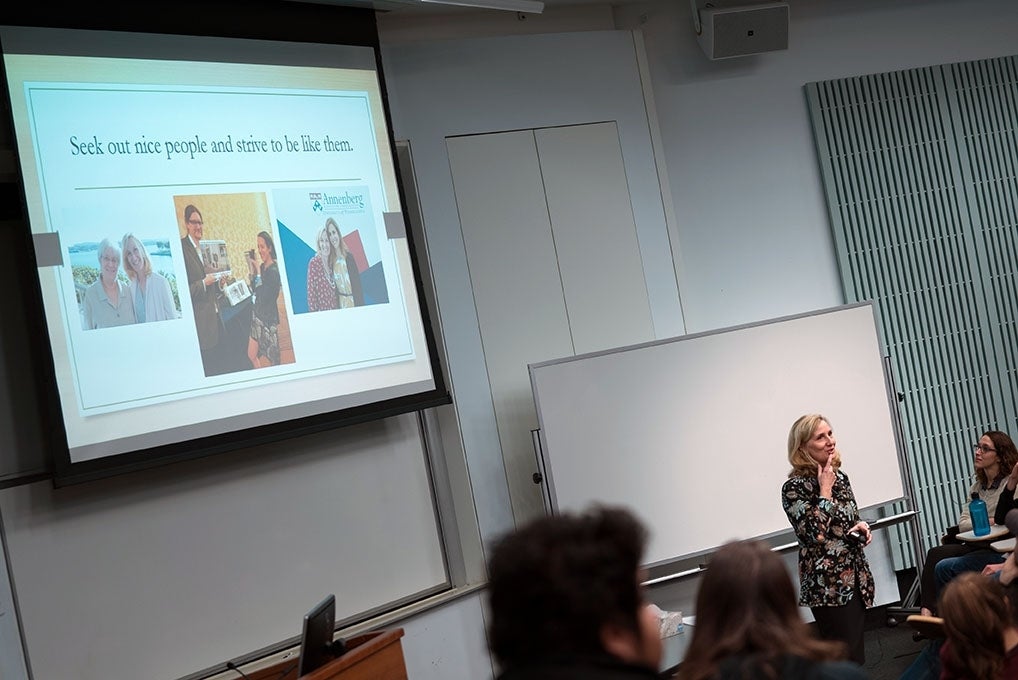
6. If you screw up, own up.
If I could have a conversation with my 19-year-old self, I would say, “You are going to screw up, and you are going to screw up in some major ways.” But it is almost always the case that if you own your screw up-edness, you will be forgiven. I majorly screwed up back in the 1990s when I was planning a conference. I lay on the floor of my office in a panic and came up with all kinds of excuses and stories about how it wasn’t my fault. But in the end, I went to the dean’s office, knocked on her door, and said “I screwed up and here’s how.” She was on the phone until midnight trying to undo what I did, and she fixed it. But she wouldn’t have been able to if I hadn’t come clean.
7. Have a role model.
Nineteen-year-old me thought it was really important to have a mentor, and that said mentor would pave the way for me to have a glorious job all the while providing insights into how to make it in this world. And I did have mentors, of sorts. But what has been so much more important in my life are my role models.
I can say that as a 19-year-old, Gloria Steinem, one of the most powerful feminists of our time, was someone I aspired to be like. In fact last year, when I met her for the first time, the thought went through my head that “Oh my god, I’m breathing the same air as Gloria Steinem.” And I inhaled deeply. There are so many great role models out there if we look around. They can be famous leaders, or they can be those people in our lives who show us what it means to love.
8. Seek out nice people, and strive to be like them.
I would like to tell my 19-year-old self the importance of having positive people in your orbit. I remember once seeing someone read a book called “The No-Assholes Rule” which, I later learned, was a best seller. First, I was shocked that a book could have such a title. Then, I considered what it meant. I don’t have a no assholes rule — because sometimes these flawed and imperfect people are interesting. They also get stuff done. But I’d much rather be around people who are nice.
Dont's
1. Don’t search for hidden meaning in a professor’s communication.
When I am busy, stressed, and pressed for time, and an email comes in from a student, the thing at the front of my mind is that I want to dispatch with it as expediently as possible. No offense. What professors don’t always realize is that brevity, lack of greeting, and unpunctuated sentences can feel dismissive, angry, or confusing to students. So I’m here to say I’m sorry, and please don’t take offense. Most of us don’t mean to sound mean. And I also want to say that if, in our brevity, we have not answered your question, it’s really fine to follow up.
2. Don’t take life too seriously.
When I was in high school, I was voted “most sophisticated.” In other words, I was the class killjoy. But that is really hard to keep up. On the serious-meter I would still trend closer to killjoy than life of the party, but I’ve learned something that I wish my 19-year-old self knew. It’s okay to be a goofball. It’s okay to have a goal of making somebody laugh. Life is short — make funny faces.
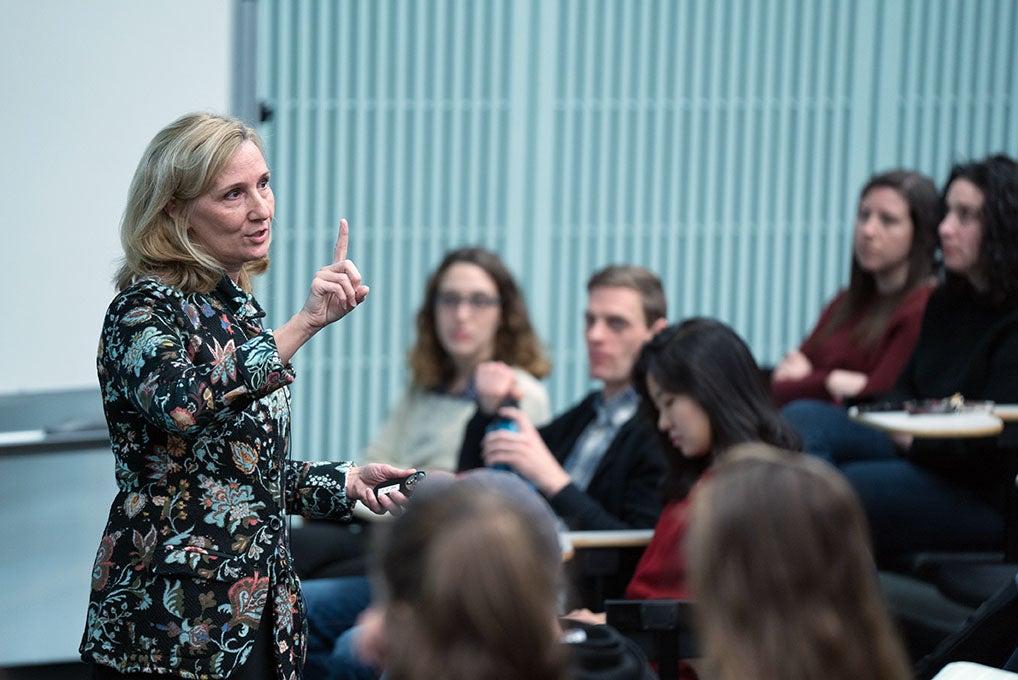
Things to Remember
1. Remember that interesting people are imperfect people.
Many of us who are in places like Penn think that we need to be perfect to earn the right to be here. I wish I knew when I was 19 that there was no one going around with a perfect-meter, gauging just how perfect someone is. When I’m around students who let their imperfections show, or when I’m with someone who embraces the imperfectness of their existence, I feel like I can be a little bit more like myself. Some of my favorite alums who have passed through my classes were not the ones who got A+ grades, and they were okay with that. They had other interests and a bigger sense of who they were and where they wanted to go.
2. Remember that the path to your dream may be indirect.
When I was in my 20s, and maybe three years into my Ph.D. program, I took a ride in a car up the PA Turnpike to the Pocono Mountains with my boyfriend (now husband). We were pondering the future — our future together, our future career goals. When we got specific about jobs, I said that my dream job would be to work for Sesame Street. I knew there were smart researchers there doing important things for children. I wasn’t sure I wanted to be a professor. So we made this plan and we called it the “turnpike plan.”
Then life happened. We got married. He finished medical school. I finished my Ph.D. program. We had kids. And I started working at Penn in different jobs. I wasn’t working at Sesame Street, but I was appreciating the experiences I was accumulating. And then one day, the president of Sesame Workshop asked me if I would be willing to be interviewed to be a member of the Workshop’s board of trustees. I screamed “YES!” (But that was okay because he asked me by email!)
The trustees voted me in, and as I sat in my first board meeting, talking about what we need to do for children and how we can use research to guide the production of the best possible content, I realized I’ve achieved my dream. I am exactly where I hoped I would be. The distance I travelled was farther than the drive up to the Poconos — and it’s been a long and winding road — but I have arrived. I am going to be a full professor at Rutgers University contributing to scholarship on youth and media and training the next generation of scholars — and I still get to hang out with Muppets.
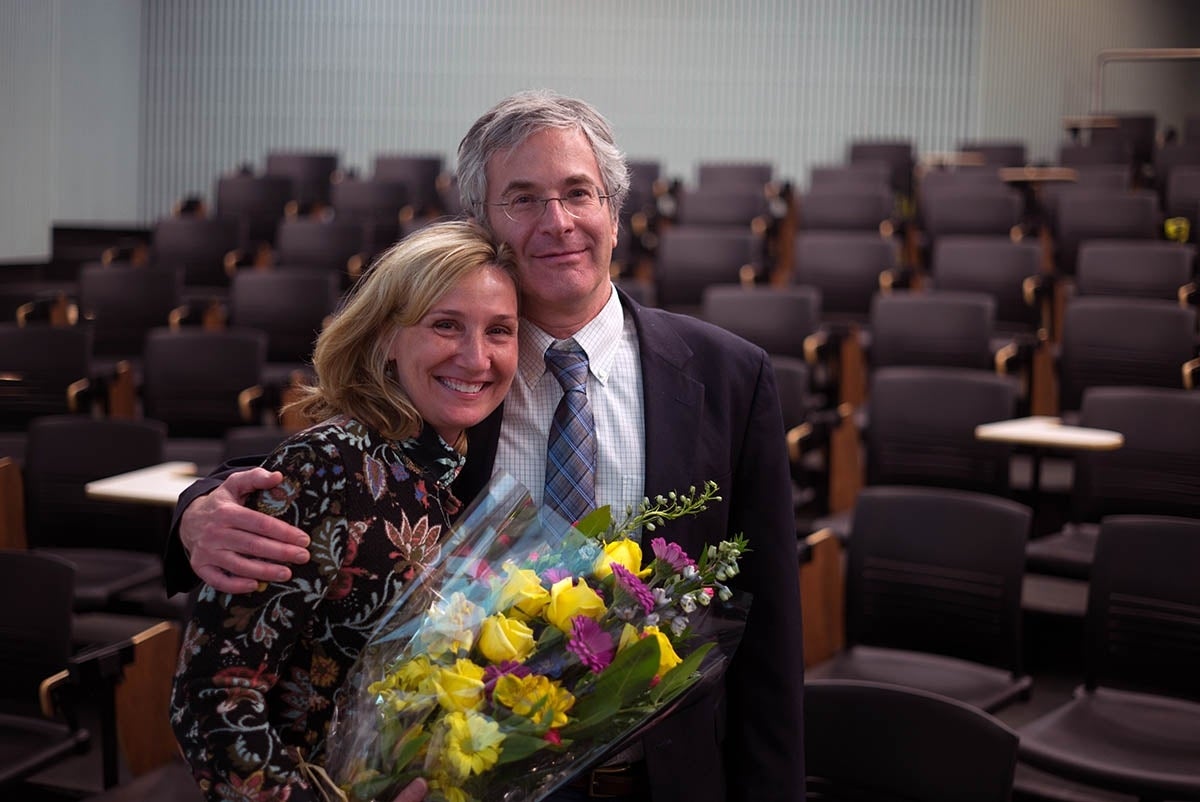
3. Be aware that sometimes the place you are used to is not the place you belong.
A few years ago, I went to see the film The Queen of Katwe about a girl named Phiona growing up in a slum in Kampala, Uganda. Phiona’s life changes one day when she meets a missionary, who is teaching children how to play chess. It turns out that she is a phenomenally talented chess player, and her talents can take her away from Katwe. But it is hard for her to leave because Katwe was all she knew. The turning point in the movie for her — and it turns out for me — was when the missionary, Robert Katende, says to her “sometimes the place you are used to is not the place you belong.”
That line hit me like a punch in the stomach. Penn has been a really great place for me for a really long time. I know every corner of Annenberg, and I know most everything about its people. I know what time of the month the soda machine runs out of Diet Coke. I know which days of the academic year will produce sleepy students, like the Friday of Spring Fling or the day after Thanksgiving break. I’m used to it. But just because I’m used to it, that doesn’t mean it’s the only place I belong.
So I’m off to meet new people and have new adventures. I’ll always be tied to this place — I am an alum after all and I have many good friends here — but it’s time.
So with that, my beautiful students, thank you and farewell.

